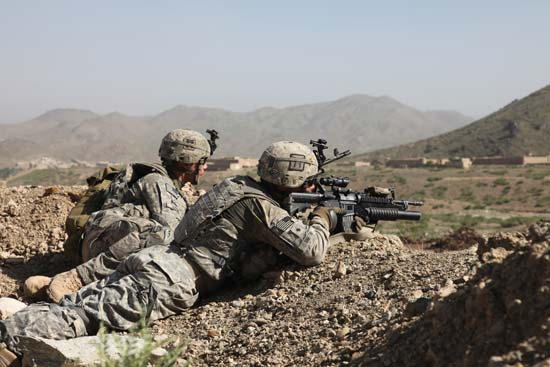A Pepper Grinder Post
War Zone
I need to start by saying that I have never served in the Armed Forces. When I speak about being a soldier, my information and impressions are all second-hand. So why would I write a war-themed blog posting at all? One reason is that the New Testament uses military analogies for the Christian life several times. The other reason is that I've come to see more and more clearly over the past few years that we really are in a constant spiritual battle. I believe the battle goes on whether or not we acknowledge it. The difference is that we'll get better results if we see what's happening and take an active part in the fight.
I want to focus on 2 Timothy 2:3-4, since this passage most clearly spells out the implications for us of living in a spiritual war zone. Here is my translation of this short passage:
Suffer along with us, as a good soldier of Jesus Christ. No one serving as a soldier becomes entangled in everyday affairs--he wants to please his commander.
When the NIV translates this passage, it blunts the start of verse 3 by saying, "Endure hardship with us," but I don't think this is the best translation. The Greek literally says to suffer along with us, and the grammar makes this clearly a command. This brings up the question of how Timothy is supposed to do this. Is Paul telling him to whip or starve himself, as some medieval monks are supposed to have done?
 If we read all of 2 Timothy, it becomes clearer what the situation is and what Paul is asking. Paul is in prison (this is probably the final imprisonment before his execution, not the imprisonment at the end of Acts, which scholars believe ended with Paul's release), and many Christians have distanced themselves from him. In 2 Timothy 1:15, Paul goes so far as to say, "Everyone in the province of Asia has deserted me, including Phygelus and Hermogenes." (NIV)
If we read all of 2 Timothy, it becomes clearer what the situation is and what Paul is asking. Paul is in prison (this is probably the final imprisonment before his execution, not the imprisonment at the end of Acts, which scholars believe ended with Paul's release), and many Christians have distanced themselves from him. In 2 Timothy 1:15, Paul goes so far as to say, "Everyone in the province of Asia has deserted me, including Phygelus and Hermogenes." (NIV)
Early in this letter, Paul explicitly stated the plea to Timothy that is one of the main messages of this epistle: "do not be ashamed to testify about our Lord, or ashamed of me his prisoner. But join with me in suffering for the gospel, by the power of God." (2 Timothy 1:8, NIV) While I think people sometimes make too much of Timothy's timidity, it is clear that Paul is worried that this young man might be tempted to distance himself from Paul and from the Christian message that landed Paul in prison. Since so many others have apparently taken this step, it doesn't seem to say anything especially damning about Timothy, that Paul is afraid he might also move to protect himself.
And why would it be so bad for Timothy to be cautious? Proverbs has many things to say about caution and prudence. Timothy wouldn't have to renounce Christ or Paul to protect himself. He could just try to emphasize the parts of the Christian message that wouldn't offend the culture around him, and he could just not mention the divisive figure who had been his mentor. One could see this as an attempt to spread the influence of the Gospel.
But the cautious approach is not what Paul recommends to Timothy or to us. He tells Timothy to join with him in suffering for Christ. I don't believe this means we should seek out suffering, but rather that we should not alter our convictions, loyalties, or expressions of such to avoid suffering. We can and should try to say things in a loving way, but we should say what we truly believe. We can't soft-pedal the message of the Bible to make it more appealing. That might seem like an altruistic attempt to draw more people to the truth, but when we strip away the nice-sounding rationales, I believe we will find fear at the core.
And now comes the military analogy that struck me when I read this passage. Paul makes the point that a soldier on active duty doesn't become entangled in everyday affairs. What does that mean for us? Should we forget about doing the dishes and taking out the trash? Should we quit our jobs and go into some form of ministry full-time? Understanding the Greek word I've translated as become entangled will help us here. Although the word only appears twice in the New Testament (in our passage and in 2 Peter 2:20), both times used metaphorically, it appears with a literal meaning in other Greek literature. In these cases, it refers to an animal which is trapped because its fur is tangled up in something like thorns.
Paul is not warning us about involvement in everyday life, he is warning us about things that might trap us and keep us from following Christ. The New Testament message is not one that demands asceticism. On the other hand, I believe that to be a true follower of Christ, we must not have too firm a grip on anything or anyone. Do we enjoy our car? That's not bad in itself, but can we tell God he can smash that car if he wants? Are we attached to our friends? That can be good, but what if we had to choose between being faithful to Christ and not alienating our friends? Are we willing to let God rob us of our comforts, our health, our relationships?
 Why should we be willing to give up the things that most people would say are the things that make life worth living? Like the soldier Paul mentions, it is because we want to please our commander. Basically, our lives come down to a stark choice: we can live to please ourselves, or we can live to please God.
Why should we be willing to give up the things that most people would say are the things that make life worth living? Like the soldier Paul mentions, it is because we want to please our commander. Basically, our lives come down to a stark choice: we can live to please ourselves, or we can live to please God.
Look around you. You'll see people doing everything possible to optimize their health and fitness. You'll see others trying to maximize their pleasure. You'll see others striving for fame or influence. Those paths may sound different, but when all the trappings are stripped away, all these people are living to please themselves. They may have different fears and desires driving them, but, at the end of the day, they are living to quell those fears and satisfy those desires.
This is not the call of the Christian. We aren't called to try to make ourselves miserable, but we are called to please our commander, whether that brings us happiness or misery. We do this because we love and trust our commander. We believe that his strategy is the right one, even if we have to surrender our lives to accomplish the victory.
Here's the thing I've become acutely aware of in recent years: we are living in the midst of an intense spiritual war. The war doesn't stop because I don't realize it's going on. The more I am aware of the fight and what is happening, the more I pray, and the more I'm able to focus on the things that are truly important. I find myself focusing on spiritual realities, not because I want to be a good, pious person, but because I need to. A soldier doesn't strap on his Kevlar vest just because army regulations say to; he knows it might save his life. It's a war. People die; people get injured; but if I am awake to what is going on, I can join the fight, instead of just sitting in my tent and playing with my newest toy. I want to be fighting. I want to please my commander.
- Pepper
Posted 2018-11-09
*Image Credits: soldiers from britannica.com
